#Patrick Auffay
Text

[Note: This poll is a re-do of an older poll, as the original poll received less than 2,000 votes.]
#movies#polls#the 400 blows#400 blows#50s movies#françois truffaut#jean pierre léaud#claire maurier#albert rémy#georges flamant#patrick auffay#redone poll#have you seen this movie poll
53 notes
·
View notes
Text

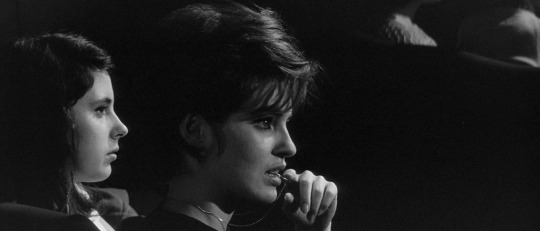



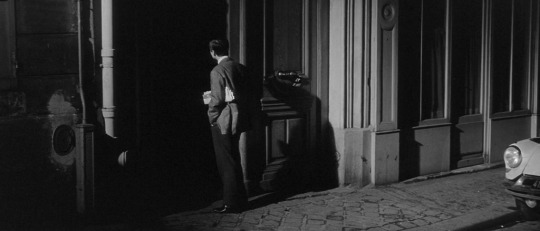

Antoine et Colette, 1962. Dir. by François Truffaut.
#françois truffaut#Jean-Pierre Léaud#Marie-France Pisier#Patrick Auffay#Antoine et Colette#60s film#b&w#cinema#cinematography#film is not dead#film scenes#new wave#Nouvelle Vague
5 notes
·
View notes
Photo
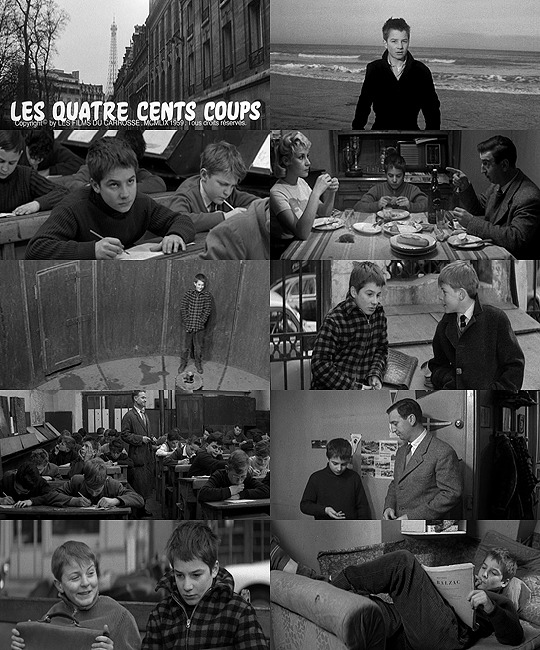
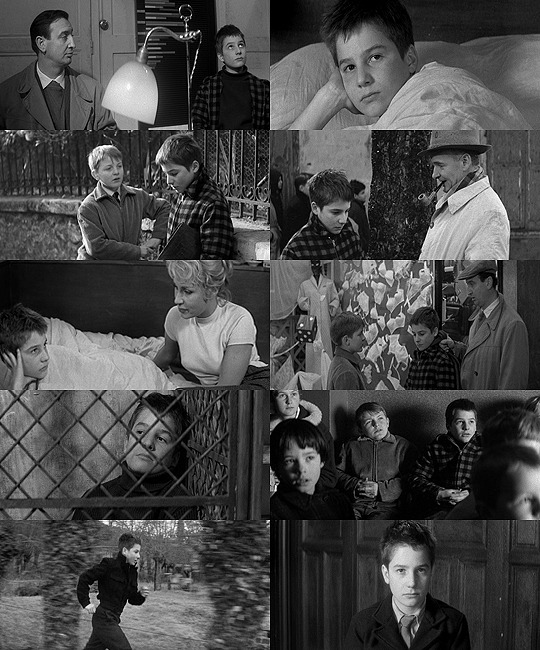
Films Watched in 2023:
51. Les Quatre Cents Coups/The 400 Blows (1959) - Dir. François Truffaut
#Les Quatre Cents Coups#The 400 Blows#François Truffaut#Jean-Pierre Léaud#Claire Maurier#Albert Rémy#Georges Flamant#Patrick Auffay#Robert Beauvais#Yvonne Claudie#Pierre Repp#Guy Decomble#Antoine Doinel#Films Watched in 2023#My Edits#My Post
11 notes
·
View notes
Text
The Antoine Doinel Cycle
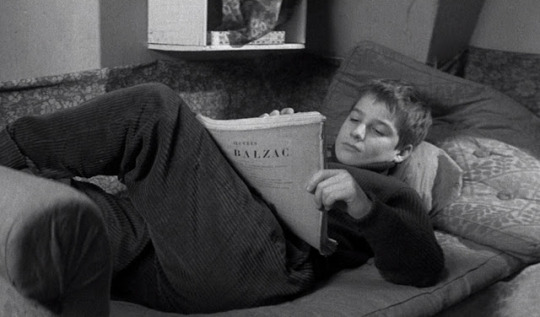
Jean-Pierre Léaud in The 400 Blows (François Truffaut, 1959)
Cast: Jean-Pierre Léaud, Albert Rémy, Claire Maurier, Patrick Auffay, Georges Flamant. Screenplay: François Truffaut, Marcel Moussy. Cinematography: Henri Decaë. Film editing: Marie-Josèphe Yoyotte. Music: Jean Constantin.
One of the unquestioned great movies, and one of the greatest feature-film directing debuts, The 400 Blows would still resonate with film-lovers even if François Truffaut hadn't gone on to create four sequels tracking the life and loves of his protagonist, Antoine Doinel (Jean-Pierre Léaud). There are, in fact, those who think that the last we should have seen of Antoine was the haunting freeze-frame at the end of the film. But Antoine continued to grow up on screen, and perhaps more remarkably, so did Léaud, carving out his own career after his debut as a 13-year-old. (It's hard to think of any American child actors who were able to maintain a film career into adulthood as well as Léaud did. Mickey Rooney? Dean Stockwell? Who else?) Having Truffaut as a mentor certainly helped, but Léaud had an unmistakable gift. He is on screen for virtually all of the 99-minute run time, and provides a gallery of memorable moments: Antoine in the amusement-park centrifuge, Antoine in the police lockup, Antoine on the run -- in cinematographer Henri Decaë's brilliant long tracking shot. And my personal favorite moment: when the psychologist asks Antoine if he's ever had sex. Léaud responds with a beautiful mixture of surprise, amusement, and embarrassment. It's so genuine a response that I have to think it was improvised, that Truffaut surprised Léaud with the question. But even so, Léaud never drops character in his response. This praise of Léaud is not to undervalue the magnificent supporting cast, or the haunting score by Jean Constantin. It's a film in which everything works.
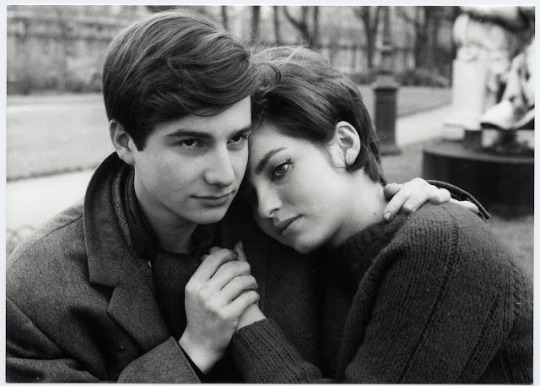
Jean-Pierre Léaud and Marie-France Pisier in Antoine and Colette (François Truffaut, 1962)
Cast: Jean-Pierre Léaud, Marie-France Pisier, Rosy Varte, François Darbon, Patrick Auffay, Jean-François Adam. Screenplay: François Truffaut. Cinematography: Raul Coutard. Music: Georges Delerue.
Four years after he made The 400 Blows, Truffaut was asked to contribute to an anthology of short films by directors from various countries to be called Love at Twenty. As he had with the first film, Truffaut drew on his own experience, an infatuation with a girl he had met at the Cinémathèque Française. And since Léaud was available -- he had worked with Julien Duvivier on Boulevard (1960) after completing The 400 Blows -- it made sense for him to play Antoine Doinel again. A narrator tells us that Antoine had been sent to another reform school after escaping from the first, and that this time he had responded well to a psychologist: After leaving school, he has found a job working for the Phillips record company and is living on his own. Then he sees a pretty young woman at a concert of music by Berlioz and falls for her. Colette (Marie-France Pisier) is not much interested in him, but she is evidently flattered by his advances. Her parents like Antoine and encourage him so much that he rents a room across the street from them. (Truffaut had done the same thing during his crush.) But one evening when he comes to dinner at their apartment, a man named Albert (Jean-François Adam) calls on Colette and she leaves Antoine watching TV with her parents. It's a droll little film, scarcely more than an anecdote, and the stable, lovestruck Antoine doesn't seem much like either the rebellious Antoine of the first film or the more scattered Antoine of the later ones in the cycle.
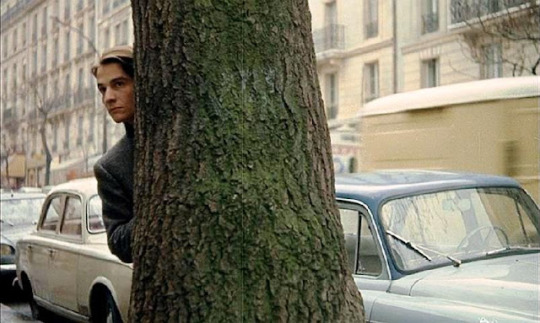
Jean-Pierre Léaud in Stolen Kisses (François Truffaut, 1968)
Cast: Jean-Pierre Léaud, Claude Jade, Michael Lonsdale, Delphine Seyrig, Michael Lonsdale, Claire Duhamel, Daniel Ceccaldi. Screenplay: François Truffaut, Claude de Givray, Bernard Revon. Cinematography: Denys Clerval. Production design: Claude Pignot. Film editing: Agnès Guillemot. Music: Antoine Duhamel.
The Antoine of Stolen Kisses is in his 20s, but has reverted to the more haphazard ways of his adolescence: He has been kicked out of the army, and now relies on a series of odd jobs to get by. But he has also renewed acquaintance with a young woman he met before going into the army, Christine Darbon (Claude Jade). Like Colette's parents, hers are quite taken with Antoine, and they help him get a job as a night clerk in a hotel. He gets fired from that job after helping a private detective who is spying on an adulterous couple, but the detective helps Antoine get a job with his agency. While working for the detective agency, he has to pose as a clerk in a shoe store, and winds up in a liaison with the store owner's wife, Fabienne (Delphine Seyrig). When that ends badly, he becomes a TV repairman, which brings him back to Christine, with whom he winds up in bed after trying to fix her TV. At the film's end, a strange man who has been following Christine comes up to her and Antoine in the park and declares his love for her. She says he must be crazy, and Antoine, who perhaps recognizes his earlier infatuation with Colette in the man's obsession, murmurs, "He must be." Stolen Kisses is the loosest, funniest entry in the cycle, though it was made at a time when Truffaut was politically preoccupied: The film opens with a shot of the shuttered gates of the Cinémathèque Française, which was shut down in a conflict between its director, Henri Langlois, and culture minister André Malraux. This caused an uproar involving many of the directors of the French New Wave. Some of Antoine's anarchic approach to life may have been inspired by the rebelliousness toward the establishment prevalent in the film community. But it's clear that the idea of a cycle of Antoine Doinel films has been brewing in Truffaut's mind: There is a cameo appearance by Marie-France Pisier as Colette and Jean-François Adam as Albert, now married and the parents of an infant.

Claude Jade and Jean-Pierre Léaud in Bed and Board (François Truffaut, 1970)
Cast: Jean-Pierre Léaud, Claude Jade, Claire Duhamel, Daniel Ceccaldi, Hiroko Berghauer. : François Truffaut, Claude de Givray, Bernard Revon. Cinematography: Néstor Almendros. Production design: Jean Mandaroux. Film editing: Agnès Guillemot. Music: Antoine Duhamel.
Antoine and Christine have married, and they have settled down in a small apartment. (There's some indication that it's paid for by her parents.) She gives violin lessons and he sells flowers -- carnations, which he dyes, using some environmentally questionable potions. But settling down isn't in Antoine's nature, and when Christine gets pregnant he looks for more lucrative work. He finds a curious sinecure in a company run by an American: Antoine maneuvers model ships by remote control through a mockup of a harbor. ("It gives me time to think," he says.) One day, a Japanese businessman comes to see the demonstration, accompanied by a pretty translator named Kyoko (Hiroko Berghauer), and Antoine is soon involved in an affair with her. Naturally, this precipitates a breakup, though by film's end they have seemingly reconciled. Still, it's obvious that the marriage is not destined to be permanent. They can't even agree on a name for their son: She wants him to be called Ghislain, and he wants to call him Alphonse. Antoine wins out by a trick: He's the one who goes to the registry office to legalize the boy's name. Antoine also spends time writing a novel about his boyhood, to which Christine objects: "I don't like this business of writing about your childhood, dragging your parents through the mud. I don't know much but I do know one thing: If you use art to settle accounts, it's no longer art." Truffaut had his own regrets about the portrait of his parents in The 400 Blows. Less farcical than Stolen Kisses, Bed and Board still has a strong vein of comedy tinged with melancholy.
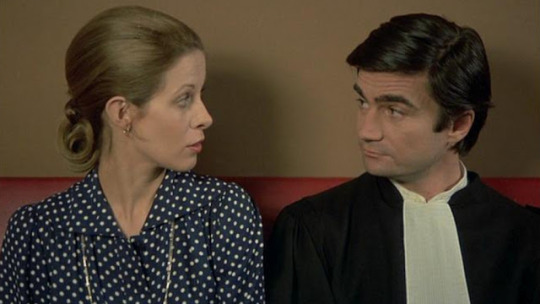
Claude Jade and Jean-Pierre Léaud in Love on the Run (François Truffaut, 1979)
Cast: Jean-Pierre Léaud, Marie-France Pisier, Claude Jade, Dani, Dorothée, Daniel Mesguich, Julien Bertheau. Screenplay: François Truffaut, Marie-France Pisier, Jean Aurel, Suzanne Schiffman. Cinematography: Néstor Almendros. Production design: Jean-Pierre Kohut-Svelko. Film editing: Martine Barraqué. Music: Georges Delerue.
Truffaut admitted that he wasn't happy with the final film in the cycle. It's a bit too heavily reliant on flashback clips from the four earlier films, and if it's intended to show that Antoine has finally stabilized now that he's in his 30s and divorced from Christine, it doesn't quite make the case. He has a new girlfriend, Sabine (Dorothée), his novel has been published several years earlier, and he works as a proofreader for a printing house. He's on friendly terms with Christine, and agrees to take their son, Alphonse, to the train station when the boy leaves for a summer music camp. At the station, he runs into Colette, now a defense lawyer, who is on her way to confer with a client -- a man who has murdered his 3-year-old boy. Perhaps a little too coincidentally, Colette is involved with Sabine's brother, Xavier (Daniel Mesguich), and she has bought a copy of Antoine's novel to read on the train. Antoine impulsively boards the train, and sets up a meeting with Colette in the dining car, after which she invites him back to her compartment. All of this sets up a series of revelations: Colette's marriage to Albert broke up after their small daughter was killed by a car. She claims that she supplements her small income as a lawyer by prostituting herself with men she meets on trains. Antoine finally made peace with his mother after her death when he met her old lover, M. Lucien (Julien Bertheau), who persuaded him to visit his mother's grave. (There is a flashback to the scene in The 400 Blows when Antoine, playing hooky, sees his mother kissing a strange man on the street.) Antoine became infatuated with Sabine after hearing a man in a phone booth arguing with a woman on the other end of the line and then tearing up her photograph. Antoine picked up the pieces from the floor, put them together, and after some sleuthing, discovered the woman was Sabine. His marriage to Christine finally broke up after he slept with her friend Liliane (Dani), who he previously had thought was having a lesbian relationship with Christine. And so on. The result of all the flashbacks and revelations is not to round out the Antoine Doinel saga, but to make Love on the Run feel over-contrived.
#The 400 Blows#Jean-Pierre Léaud#Marie-France Pisier#François Truffaut#Antoine and Colette#Stolen Kisses#Bed and Board#Claude Jade#Love on the Run
17 notes
·
View notes
Photo




Antoine and Colette (Antoine et Colette) (1962) François Truffaut
November 26th 2021
#antoine and colette#antoine et colette#1962#francois truffaut#jean-pierre léaud#marie-france pisier#francois darbon#rosy varte#patrick auffay#l'amour a vingt ans#love at 20#love at twenty
9 notes
·
View notes
Photo










Antoine and Colette (Truffaut, 1962)
#antoine and colette#antoine et colette#François Truffaut#francois truffaut#truffaut#Jean-Pierre Léaud#marie-france pisier#patrick auffay#jean-francois adam#cinema#film#france#paris
68 notes
·
View notes
Photo

Bien caché dans ma cabane, je suis l’roi d’la sarbacane.
#Les 400 Coups#François Truffaut#Jean-Pierre Léaud#Patrick Auffay#Antoine Doinel#Alain Souchon#Nouvelle Vague#Cinéma
77 notes
·
View notes
Photo

Films seen in 2019
# 229 - Antoine and Colette (François Truffaut, 1962)
#antoine and colette#antoine et colette#françois truffaut#francois truffaut#jean-pierre léaud#marie-france pisier#patrick auffay#françois darbon#rosy varte#film#films in 2019#movie#cadwalladery#films seen in 2019#mubi#classic#black and white
14 notes
·
View notes
Photo






The 400 Blows (1959)
dir. François Truffaut
#the 400 blows#françois truffaut#jean‑pierre léaud#filmedit#albert rémy#claire maurier#patrick auffay#cinematography#black and white#films#movies#faceless
704 notes
·
View notes
Photo

The 400 Blows (1959) - dir. François Truffaut
Therefore you hope for 500. Therefore you need 300. Here’s 100.
#the 400 blows#les quatre cents coups#francois truffaut#1959#antoine#jean-pierre léaud#rené#patrick auffay
3 notes
·
View notes
Photo

Movie for Monday afternoon.
#the 400 blows#jean-pierre leaud#patrick auffay#watched in '18#rewatch#jpl might be my 2nd fav male child actor after henry
1 note
·
View note
Photo

les quatre cents coups, 1959.
#les quatre cents coups#francois truffaut#french cinema#claire maurier#albert remy#guy decomble#georges flamant#patrick auffay#1959#movie#film#poster
0 notes
Photo

Les 400 Coups (1959) Director: François Truffaut, Actores: Jean-Pierre Léaud, Claire Maurier, Albert Rémy, Patrick Auffay.
Ópera prima de Truffaut, primera gran obra de la Nueva Ola y trabajo que llevó a la fama a Léaud, Les 400 Coups es una película francesa, ganadora de la mejor mise-en-scène del Festival de Cannes de 1959, que habla de la infancia desprotegida y desperdigada, que es víctima de circunstancias que desconoce y es señalada, siempre, como su propia culpable.
Antoine Doinel (que tiene su propio universo cinematográfico) es un estudiante que de vez en cuando (por cuestión de suerte), una que otra broma se le pasa de la mano. Junto a los castigos, que hoy serían inadmisibles, que le propina su profesor, también tiene que enfrentarse a una vida familiar complicada: su madre es demasiado dura con él, y su padre, que es agradable en la superficie, tiene algo de ganas de no tener una responsabilidad tan grande. Antoine vive basicamente como un mueble, es malquerido, y duerme refundido en el pasillo de su apartamento. Un día con su amigo René (que tanto lo mete como lo saca de problemas), deciden irse de pinta, y de ahí en más se desencadena una aventura insostenible que, para dos niños en París de los 50s, significa esculturas de caballos, tabaco, fotografías de chicas, leche robada, una máquina de escribir para empeñar y el sueño de Antoine: conocer el mar.
Esta película que le valió a Jean-Pierre Léaud una ovación de pie con tan solo catorce años de edad es una de las más hermosas que he visto sobre la infancia. Antoine no tiene culpa de nada, pero le culpan de todo; Truffaut estudia perfectamente la psicología de este niño que solo quiere divertirse sin que lo azoten demasiado. A diferencia de otras películas de la época, esta se siente menos teatral, la cámara esta ahí como nuestros ojos, no como el proscenio de un escenario, nosotros dejamos de ser espectadores, y pasamos a ser un tercero en el cuadro, somos el amigo de Antoine, el chismoso en la oficina, en la estación de policía, el tercer ojo que está en todas partes. Las actuaciones infantiles, particularmente la de Auffay, tienen muchísima química, actúan sin hacerlo, simplemente son, y eso, en las relaciones de amistad, es lo que casi siempre echa en falta en el cine. Léaud es, simplemente, una leyenda viva, imposible creer que alguien de aquella época siga actuando en el cine francés contemporáneo, tiene talento, siempre lo ha tenido, pero también (en sus personajes y en la vida, cosa que comparte con Antoine Doinel) tiene una madurez muy interesante, ríe sin hacerlo, es excéntrico sin demostrarlo a cada momento. Truffaut, con esta película catártica de su infancia, logró hacer un amigo de toda la vida, y encontró a un colaborador frecuente, que en el arte, como en la amistad, y en la vida misma, es el mejor regalo que cualquier casualidad puede brindarnos.
#les 400 coups#the 400 blows#jean pierre leaud#jean-pierre léaud#francois truffaut#françois truffaut#cannes#palma de oro#palm d'or#1959#50s#50s films#festival de cannes#nouvelle vague#nueva ola#cine#french cinema#cinema français#claire maurier#albert rémy#patrick auffay#antoine doinel#antoine et collete#antoine doinel cinematic universe#adcu
24 notes
·
View notes
Photo

1.12.17
#watched#film#letterboxd#francois truffaut#400 blows#jean pierre leaud#Albert Rémy#claire maurier#guy decomble#patrick auffay#pierre repp
0 notes
Text
CINE EXPRESS: “Les Quatre Cents Coups (Los 400 golpes)”
CINE EXPRESS: “Les Quatre Cents Coups (Los 400 golpes)”
Helena Garrote Carmena
Año: 1959País: FranciaDirección: François TruffautGuión: Marcel Moussy, François TruffautActores: Jean-Pierre Léaud, Claire Maurier, Albert Rémy, Guy Decomble, Georges Flamant , Patrick Auffay, Jeanne MoreauGénero: Nouvelle vague – Drama – Adolescencia
Con retazos de su propia biografía François Truffaut creó esta maravilla en la que capta el sentir de un niño frente al…

View On WordPress
0 notes
Photo

The 400 Blows (Les Quatre Cents Coups) (1959) François Truffaut
July 7th 2019
#the 400 blows#les quatre cents coups#1959#francois truffaut#jean-pierre léaud#albert remy#claire maurier#patrick auffay
0 notes